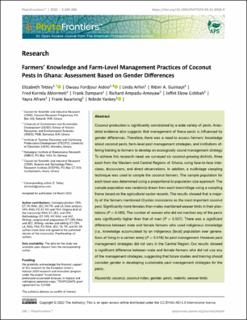| dc.contributor.author | Tettey, Elizabeth | |
| dc.contributor.author | Aidoo, Owusu Fordjour | |
| dc.contributor.author | Arhin, Linda | |
| dc.contributor.author | Guimapi, Ritter A. | |
| dc.contributor.author | Ablormeti, Fred Kormla | |
| dc.contributor.author | Dampare, Frank | |
| dc.contributor.author | Ampadu-Ameyaw, Richard | |
| dc.contributor.author | Cobbah, Jeffet Ekow | |
| dc.contributor.author | Afram, Yayra | |
| dc.contributor.author | Kwarteng, Frank | |
| dc.contributor.author | Yankey, Ndede | |
| dc.date.accessioned | 2023-03-30T18:56:46Z | |
| dc.date.available | 2023-03-30T18:56:46Z | |
| dc.date.created | 2022-08-11T14:07:02Z | |
| dc.date.issued | 2022-07-08 | |
| dc.identifier.citation | PhytoFrontiers™. 2022, 2 (3), 280-288. | en_US |
| dc.identifier.issn | 2690-5442 | |
| dc.identifier.uri | https://hdl.handle.net/11250/3061270 | |
| dc.description.abstract | Coconut production is significantly constrained by a wide variety of pests. Anecdotal evidence also suggests that management of these pests is influenced by gender differences. Therefore, there was a need to assess farmers' knowledge about coconut pests, farm-level pest management strategies, and institutions offering training to farmers to develop an ecologically sound management strategy. To achieve this research need, we surveyed six coconut-growing districts, three each from the Western and Central Regions of Ghana, using face-to-face interviews, discussions, and direct observations. In addition, a multistage sampling technique was used to sample the coconut farmers. The sample population for each town was determined using a proportional to population size approach. The sample population was randomly drawn from each town/village using a sampling frame based on the agricultural sector records. The results showed that a majority of the farmers mentioned Oryctes monoceros as the most important coconut pest. Significantly more females than males mentioned weaver birds in their plantations (P = 0.035). The number of women who did not mention any of the pests was significantly higher than that of men (P = 0.007). There was a significant difference between male and female farmers who used indigenous knowledge (i.e., knowledge accumulated by an indigenous [local] population over generations of living in a certain area) (P = 0.018) for pest management. However, pest management strategies did not vary in the Central Region. Our results showed a significant difference between male and female farmers who did not use any of the management strategies, suggesting that future studies and training should consider gender in developing sustainable pest management strategies for the pests. | en_US |
| dc.description.abstract | Farmers’ Knowledge and Farm-Level Management Practices of Coconut Pests in Ghana: Assessment Based on Gender Differences | en_US |
| dc.language.iso | eng | en_US |
| dc.publisher | American Phytopathological Society | en_US |
| dc.rights | Attribution-NonCommercial-NoDerivatives 4.0 Internasjonal | * |
| dc.rights.uri | http://creativecommons.org/licenses/by-nc-nd/4.0/deed.no | * |
| dc.title | Farmers’ Knowledge and Farm-Level Management Practices of Coconut Pests in Ghana: Assessment Based on Gender Differences | en_US |
| dc.title.alternative | Farmers’ Knowledge and Farm-Level Management Practices of Coconut Pests in Ghana: Assessment Based on Gender Differences | en_US |
| dc.type | Peer reviewed | en_US |
| dc.type | Journal article | en_US |
| dc.description.version | publishedVersion | en_US |
| dc.rights.holder | © 2022 The Author(s) | en_US |
| dc.source.pagenumber | 280-288 | en_US |
| dc.source.volume | 2 | en_US |
| dc.source.journal | PhytoFrontiers™ | en_US |
| dc.source.issue | 3 | en_US |
| dc.identifier.doi | 10.1094/PHYTOFR-09-21-0058-R | |
| dc.identifier.cristin | 2042463 | |
| dc.relation.project | EC/H2020/727459 | en_US |
| cristin.ispublished | true | |
| cristin.fulltext | original | |
| cristin.qualitycode | 1 | |

